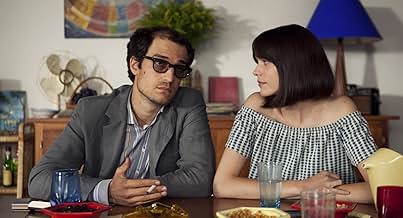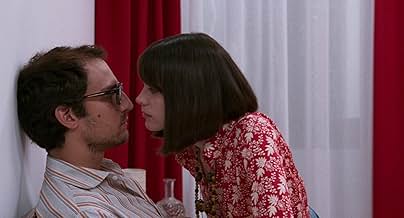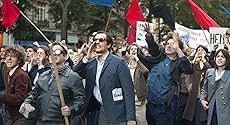IMDb RATING
6.6/10
6.3K
YOUR RATING
In 1967, during the making of "La Chinoise," film director Jean-Luc Godard falls in love with 19-year-old actress Anne Wiazemsky and marries her.In 1967, during the making of "La Chinoise," film director Jean-Luc Godard falls in love with 19-year-old actress Anne Wiazemsky and marries her.In 1967, during the making of "La Chinoise," film director Jean-Luc Godard falls in love with 19-year-old actress Anne Wiazemsky and marries her.
- Director
- Writers
- Stars
- Awards
- 10 nominations total
- Director
- Writers
- All cast & crew
- Production, box office & more at IMDbPro
Featured reviews
Godard may have been one of the French New Wave's main stars but, as a person, he could be repulsive without trying. Not that the film portrays him as overly selfish or self-centered, but he seems to live in his own mind, and have standards that he switches at his own convenience.
As the film opens, he is 37 and he has just started a romantic involvement with 19 year old exquisitely beautiful wife to be Anne (solidly played by Stacy Martin, who looks very much like Catherine Deneuve at the height of her splendor, only better) . Given that the film is mostly told from Anne's point of view, we get to see Godard's steady mental disintegration and growing loss of touch with reality, as told from her standpoint, while all along she keeps retiring into an observer's position. In light of the fact that the film is based on Anne Wiazemsky's autobiographical account of her relationship with Godard, she emerges from this film with her image apparently far more intact - but also as a bit of a tell-tale who thinks nothing of reducing her former husband's reputation to the lowest possible level.
Physically, Louis Garrel looks like Godard, imitates his famous lisp very well, and his performance is superb, even if the character does nothing to encourage anyone's sympathy, let alone liking. The way he joins the student demonstrations of May 1968, but flees police as soon as he feels that he is in danger; and the way he bends Maoist doctrine to his own take on life, says much about the pitfalls of this once and briefly great director.
Michel Hazanavicius' direction is first class, his screenplay not really. The submarine, Le Redoutable, and the repeatedly broken spectacles are jokes that have worn rather thin by film's end.
Soundtrack is generally vivid and brings back the day, including some lovely music, but there is also some jarring noise, typical of what made Godard so unique in films like MASCULINE FEMININE, A BOUT DE SOUFFLE, LE MÉPRIS.
Ultimately, it is a movie for lovers of the French cinema. I am one, and I am grateful for what I learned from it. That said, LE REDOUTABLE/GODARD MON AMOUR makes for some rather uncomfortable viewing because of Godard's disintegration. On the other hand, thank God Stacy Martin is so beautiful, with her around I can forgive any flaws in the movie.
As the film opens, he is 37 and he has just started a romantic involvement with 19 year old exquisitely beautiful wife to be Anne (solidly played by Stacy Martin, who looks very much like Catherine Deneuve at the height of her splendor, only better) . Given that the film is mostly told from Anne's point of view, we get to see Godard's steady mental disintegration and growing loss of touch with reality, as told from her standpoint, while all along she keeps retiring into an observer's position. In light of the fact that the film is based on Anne Wiazemsky's autobiographical account of her relationship with Godard, she emerges from this film with her image apparently far more intact - but also as a bit of a tell-tale who thinks nothing of reducing her former husband's reputation to the lowest possible level.
Physically, Louis Garrel looks like Godard, imitates his famous lisp very well, and his performance is superb, even if the character does nothing to encourage anyone's sympathy, let alone liking. The way he joins the student demonstrations of May 1968, but flees police as soon as he feels that he is in danger; and the way he bends Maoist doctrine to his own take on life, says much about the pitfalls of this once and briefly great director.
Michel Hazanavicius' direction is first class, his screenplay not really. The submarine, Le Redoutable, and the repeatedly broken spectacles are jokes that have worn rather thin by film's end.
Soundtrack is generally vivid and brings back the day, including some lovely music, but there is also some jarring noise, typical of what made Godard so unique in films like MASCULINE FEMININE, A BOUT DE SOUFFLE, LE MÉPRIS.
Ultimately, it is a movie for lovers of the French cinema. I am one, and I am grateful for what I learned from it. That said, LE REDOUTABLE/GODARD MON AMOUR makes for some rather uncomfortable viewing because of Godard's disintegration. On the other hand, thank God Stacy Martin is so beautiful, with her around I can forgive any flaws in the movie.
First, I can't think of any other film that treats the life of a director, except for Greenaway's Eisenstein In Guanajuato, and the far better known Chaplin. To have his life immortalized this way, a director would have to be a really fascinating person, and I doubt Godard is.
Second, we see how terribly self-absorbed he is throughout. He seems not to care for any of the people around him. The scene in the restaurant when he insults the old man and his wife should have ended in a fist fight, but cooler heads prevailed. Anne wants to make a film with Marco Ferreri--it will be her eleventh--but Godard objects violently: there's too much nudity. This is his wife who will be seen naked, and he forces Ferreri to shoot her with clothes on. Louis Garrel is especially fine in this scene, while Stacy Martin turns in a performance of some skill which makes me forget about the awful film she did with von Trier.
The best for last: about one hour into the story, we get Godard, Anne, the Bambans, Michel Cournot and the driver packed into a car headed to Paris (they'd have gone by train, but for the general strike). Cournot is down because his first and only film hasn't been shown at Cannes, Godard throws some gratuitous insults at him, and the Bambans join in. It's the ultimate bad car trip.
Second, we see how terribly self-absorbed he is throughout. He seems not to care for any of the people around him. The scene in the restaurant when he insults the old man and his wife should have ended in a fist fight, but cooler heads prevailed. Anne wants to make a film with Marco Ferreri--it will be her eleventh--but Godard objects violently: there's too much nudity. This is his wife who will be seen naked, and he forces Ferreri to shoot her with clothes on. Louis Garrel is especially fine in this scene, while Stacy Martin turns in a performance of some skill which makes me forget about the awful film she did with von Trier.
The best for last: about one hour into the story, we get Godard, Anne, the Bambans, Michel Cournot and the driver packed into a car headed to Paris (they'd have gone by train, but for the general strike). Cournot is down because his first and only film hasn't been shown at Cannes, Godard throws some gratuitous insults at him, and the Bambans join in. It's the ultimate bad car trip.
It is such a pity that it was not enough for the director to talk about Godard, he also tried to make a film in Godard's style. In my opinion, he was not able to capture the "Godard mood" at all. Instead, the film is executed in a textbook manner, meticulously using Godard's cinematic language like a receipt and that's always a risky move (for example, Gus Van Sant's case with Psycho). Godard is Godard not for using these elements, but because he used them at the right time and in the right way. If this would have been done by breaking new grounds in cinematic language, or even without breaking the mould in such a way BUT finding the right tone, I would have liked the film much more. Godard's world has a sexy, humorous yet tragic atmosphere, where the viewer feels for the characters. To be honest, when watching a Godard movie, I'm always terribly envious that I was not born at the time of Belmondo. Here, I did not feel this longing, sadly. Having said that, the actors are cute and the director seems to be cool and all, judging from interviews, so it may be that I'm just too sentimental. :)
This bizarre mélange of genres--documentary, comedy, tell-all from a former lover--views above all like a hit job. This is the second film I encountered this week which focuses on a disgruntled former girlfriend´s unhappiness that her extraordinary lover turned out not to be entirely normal. (The other one was Mad to be Normal, about Scottish psychiatrist R.D. Laing). I find this sort of depiction of Godard, on the one hand, and R. D. Laing, on the other, to be disagreeable in the extreme. I have no difficulty believing that men with big personalities and egos are difficult to have relationships with. But to make an entire film about what a cad ¨the cad¨ is alleged to be (by a former lover) strikes me as an unvarnished act of revenge. Nietzsche (and probably Godard, since he has always liked Nietzsche) would surely identify in this production a consummate expression of ¨ressentiment¨.
It seems to me that there is something rather puerile about falling in love with someone who is an artist (touted by many as a creative genius) and then expecting him to suddenly be the average-joe husband and dad (in the case of R.D. Laing). How could that possibly turn out to be the case? It´s a package deal. You get the extraordinarily wonderful with the extraordinarily difficult to live with. Needless to say, I do not think well of the female protagonist here, who seems to have wanted to profit from what she viewed as her victimhood. Ugh.
I also found confusing that the director tried to imitate Godard´s style--part of the time, but not all of the time--while also trashing him. A confusing and unsatisfying creation, in my opinion. The comedic elements pretty much disappeared by the end, when all that remains is the whiny girlfriend and what is depicted as Godard´s descent into Maoist Marxism.
Godard haters will love this thrashing.
It seems to me that there is something rather puerile about falling in love with someone who is an artist (touted by many as a creative genius) and then expecting him to suddenly be the average-joe husband and dad (in the case of R.D. Laing). How could that possibly turn out to be the case? It´s a package deal. You get the extraordinarily wonderful with the extraordinarily difficult to live with. Needless to say, I do not think well of the female protagonist here, who seems to have wanted to profit from what she viewed as her victimhood. Ugh.
I also found confusing that the director tried to imitate Godard´s style--part of the time, but not all of the time--while also trashing him. A confusing and unsatisfying creation, in my opinion. The comedic elements pretty much disappeared by the end, when all that remains is the whiny girlfriend and what is depicted as Godard´s descent into Maoist Marxism.
Godard haters will love this thrashing.
At the beginning of 1968 Jean-Luc Godard is one of the most highly-respected directors working in French-language cinema. He is influential and admired. He has also just married Anne Wiazemsky, a teenage actress seventeen years his junior. He has the more arty end of the film world at his feet, yet he is feeling restless.
Then erupt the Paris student protests which sweep Godard up in their revolutionary fervour. He becomes a supporter of the movement, and his opinions are in turn sought out by the young leaders (although, in the best tradition of ideologues everywhere, they also spend a large amount of their time arguing). As his marriage to Wiazemsky suffers, Godard heads further down what some might describe as a Maoist path, culminating - for this film's purposes - in the establishment of a sort of film-making collective without heirarchy - Godard may be the director, but his artistic vision is subordinate to the will of the workers. Hah!
From the plot description this might seem like a terribly gloomy film; far from it. It is actually very playful: as Godard, Louis Garrel has to deliver directly to camera the line "I bet if you told an actor to say actors are dumb, he would do it"; and a scene where Godard and Wiazemsky (played by the frequently-undraped Stacy Martin) discuss film directors' enthusiasm for nude scenes is played with both actors naked. How accurate Garrel's portrayal is I am unable to say, but for an actor who has rarely before displayed any comedy chops he provides a fine, subtly comic turn here; I particularly like the hangdog look his Godard at times displays.
I am not massively familiar with either Godard or his work; I have little patience with pretention. But this film makes the famed auteur a more accessible - sometimes rather likeable - individual, without glossing over his faults (rudeness; arrogance; a controlling element in his relationship with Wiazemsky). Whether it is a fair representation of him I do not know, but it makes for a very interesting film.
I am not massively familiar with either Godard or his work; I have little patience with pretention. But this film makes the famed auteur a more accessible - sometimes rather likeable - individual, without glossing over his faults (rudeness; arrogance; a controlling element in his relationship with Wiazemsky). Whether it is a fair representation of him I do not know, but it makes for a very interesting film.
Did you know
- TriviaJean-Luc Godard himself called the movie a "stupid, stupid idea". The creators of the film then put this quote on the poster in very large font.
- Quotes
Jean-Luc Godard: Politics is like shoes. There's a left and a right, but eventually you will want to go barefoot.
- ConnectionsFeatured in Filmmelier Drops: O formidável Godard, o cinema e a política (2018)
- SoundtracksAdagio from Piano Sonata No.12 in F, K.332
Written by Wolfgang Amadeus Mozart
Performed by Maria João Pires
- How long is Godard Mon Amour?Powered by Alexa
Details
- Release date
- Countries of origin
- Official site
- Languages
- Also known as
- Yo, Godard
- Filming locations
- Paris, France(scenes in Paris in 1967 and 1968)
- Production companies
- See more company credits at IMDbPro
Box office
- Budget
- €11,110,000 (estimated)
- Gross US & Canada
- $82,264
- Opening weekend US & Canada
- $10,994
- Apr 22, 2018
- Gross worldwide
- $1,332,204
- Runtime
- 1h 47m(107 min)
- Color
- Aspect ratio
- 1.85 : 1
Contribute to this page
Suggest an edit or add missing content





































